Thinking about kicking off a career in heating, ventilation, and air conditioning (HVAC)? Getting certified is definitely the way to go.
An HVAC certification proves to employers that you’ve got the know-how to get the job done right.
It can open doors to better job opportunities and neater paychecks.

You’ve got a bunch of HVAC certification courses to choose from. The best programs equip you with both the theory and hands-on skills you’ll need for the real world. Some even offer online options that allow for a flexible learning pace.
Let’s dive into five top courses to help you find the right fit for your career goals.
1) NATE Certification: North American Technician Excellence
Hey! Want to boost those HVAC skills? NATE certification could be just what you’re looking for.
It’s a big deal in the HVAC community and can give your career a solid boost.
NATE offers a couple of pathways to certification.
You can tackle the classic route with two exams: a 50-question core test followed by a 100-question specialty test.
Sure, it sounds tough, but it really shows what you know.
If you’re looking for something less intense, check out the Certified HVAC Professional (CHP-5) program.
It breaks things down into five shorter exams, each covering different parts of HVAC work—perfect for learning incrementally.
NATE also throws in some cool entry-level certificates for beginners.
They even use 3D and VR simulations.
It’s like being out in the field without leaving your chair!
Now, keep in mind, earning that NATE certification can set you back between $100 to $300.
But don’t stress, there are affordable study materials out there.
It’s a smart investment for your future that can lead to awesome job prospects.
2) HVAC Excellence Certification: Professional Level
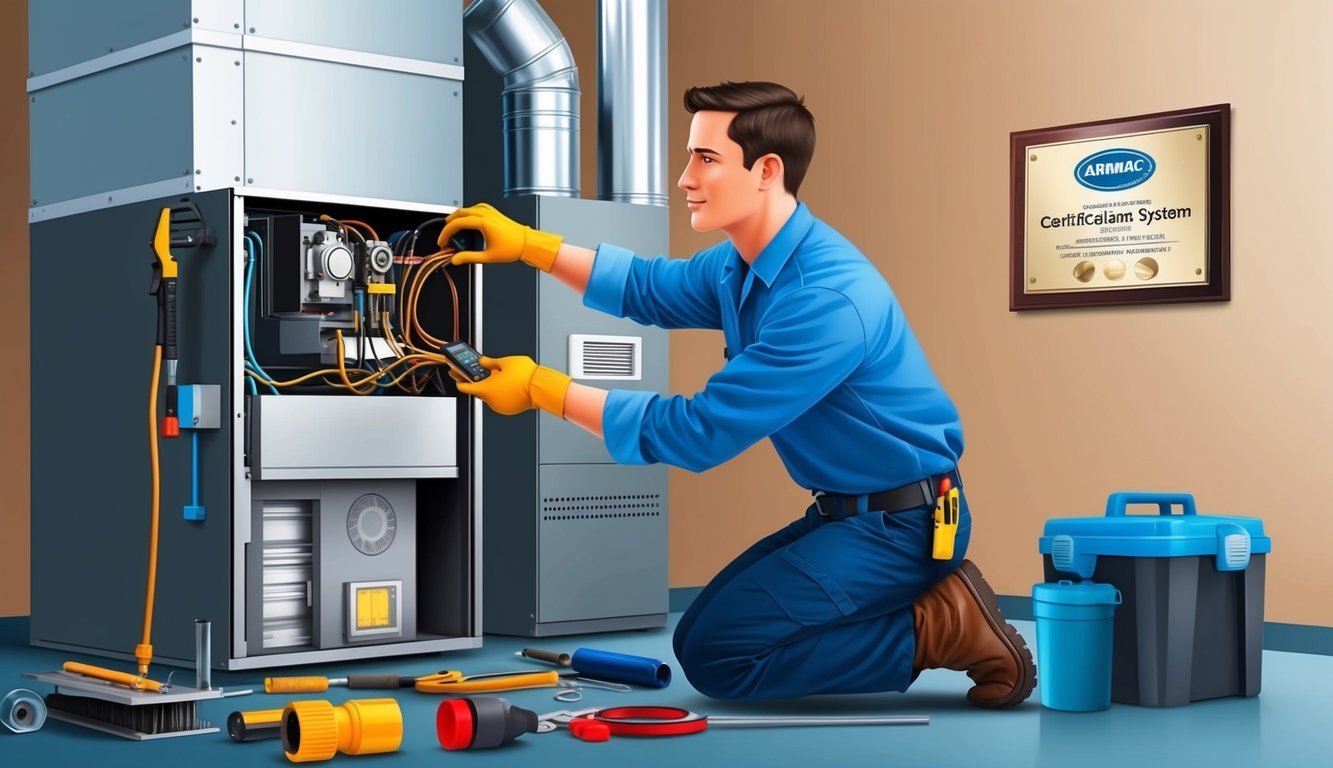
HVAC Excellence offers a top-notch certification for the pros out there.
Their Professional Level Technician Certifications are perfect for those who’ve been around the block in the industry.
These exams? They’re no cakewalk.
They’re closed-book and cover a lot.
You’ll need to know your stuff about design and how to install and service equipment.
Serious prep time is crucial, so utilizing the best CPA exam review courses available can be a lifesaver, giving you practice questions and thorough explanations that reinforce your understanding.
Plus, forming study groups with peers is a fantastic way to solidify your learning.
Each test features 100 questions and is aimed at techs with a couple of years of hands-on experience—so, if you’re just getting started, you might want to hold off for now.
The great thing? You can get certified in specific areas, allowing you to highlight your expertise in the HVAC segments you excel at.
Once you pass, you really showcase your knowledge, helping you stand out in the job market and possibly climb the career ladder.
These certifications are part of a bigger picture, dubbed “Stackable” certification by HVAC Excellence—meaning you can keep adding to your credentials as your career progresses.
3) EPA Section 608 Certification
Want to work with refrigerants? Then you’ll definitely need an EPA Section 608 Certification.
It’s a must-have for HVAC techs working with these crucial materials.
The EPA 608 Certification comes in four flavors: I, II, III, and Universal.
Each level covers different equipment and refrigerant types, with Universal being the most extensive.
You’re looking for a quick way to get that certification? Check out Virginia Technical Academy’s one-day course.
You’ll learn everything you need to ace the exam in just 4 hours.
For a more flexible route, consider Faraday’s online course and exam.
You can study at your own pace and take the test whenever you’re ready.
Just remember, you need to score at least 72% on each section to pass, with some open-book exams needing 84%.
No need to stress, though—with smart prep, you can totally nail it!
Getting your EPA 608 Certification can truly open doors in the HVAC industry, proving to employers that you know how to safely handle refrigerants.
4) RSES Certificate: Refrigeration Service Engineers Society
Want to level up your HVAC skills? You should definitely check out the Refrigeration Service Engineers Society (RSES).
They’ve been in the game since 1933, training folks just like you.
RSES offers courses covering all things heating, cooling, and refrigeration—plus classes on electricity and controls.
There’s something for everyone!
Not able to attend in person? No problem! RSES has a convenient eLearning program filled with interactive materials to keep you engaged.
And the cherry on top? You’ll earn a certificate to display when you complete the program.
It’s like a badge of honor in the HVAC world.
RSES focuses on real-world prep too.
You’ll be ready to face any HVAC challenge that comes your way.
If you’re determined to up your HVAC game, RSES could be just what you need.
Give it a shot and see where it takes you!
5) HVAC/R Technician Certificate from Penn Foster
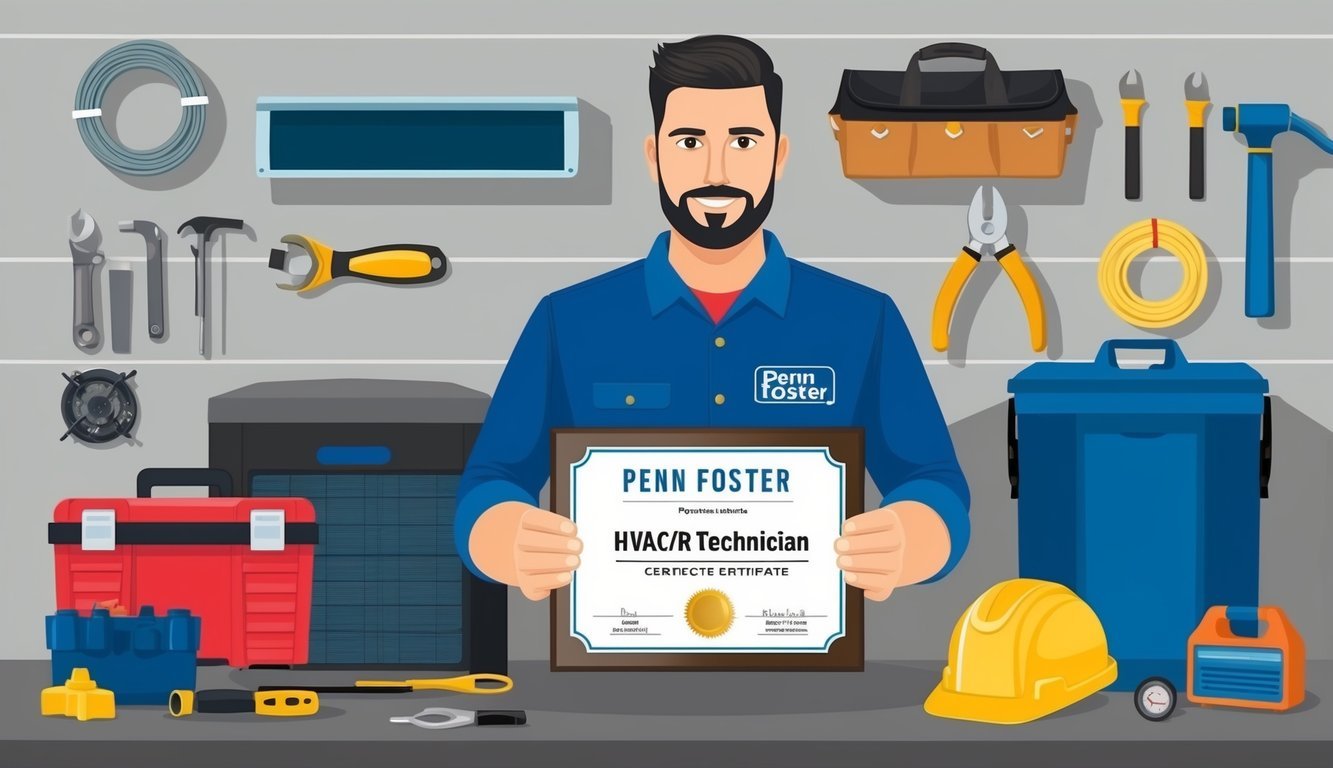
Looking to jumpstart your HVAC career without breaking the bank? Penn Foster’s HVAC/R Technician Certificate could be the ticket you’re hunting for.
This online program is designed for your busy schedule, allowing you to learn at your own pace.
Whether you’re a speed demon or like to take your time, you’re covered.
The course offers solid foundations in heating, ventilation, air conditioning, and refrigeration systems, focusing on installation, maintenance, and troubleshooting.
What’s the best part? It’s affordable! Penn Foster offers flexible payment plans that won’t strain your wallet.
Plus, they’ve got a special discount if you pay in full.
Once you finish the program, you’ll be all set to take the EPA Section 608 Certification exam.
That’s a pretty important one in the HVAC world and can really help you land a job.
The curriculum is pretty comprehensive and covers 9 courses and 23 exams.
Don’t worry, you can totally handle it! You’ll gain hands-on knowledge that’ll give you a strong start to your career.
Plus, the skills you’ll develop can extend into other technical areas.
If you’re eyeing the top systems administration programs, owning HVAC knowledge is a huge win.
This well-rounded background not only prepares you for certification but also gives you the skills to tackle real-world challenges.
You’ll even have access to resources that enhance your learning experience, like interactive modules and real-life case studies.
And hey, as you grow, consider exploring other fields that can boost your understanding, like top quality management courses.
This would not only make you more marketable but also empower you to move up the career ladder.
Why HVAC Certification Matters
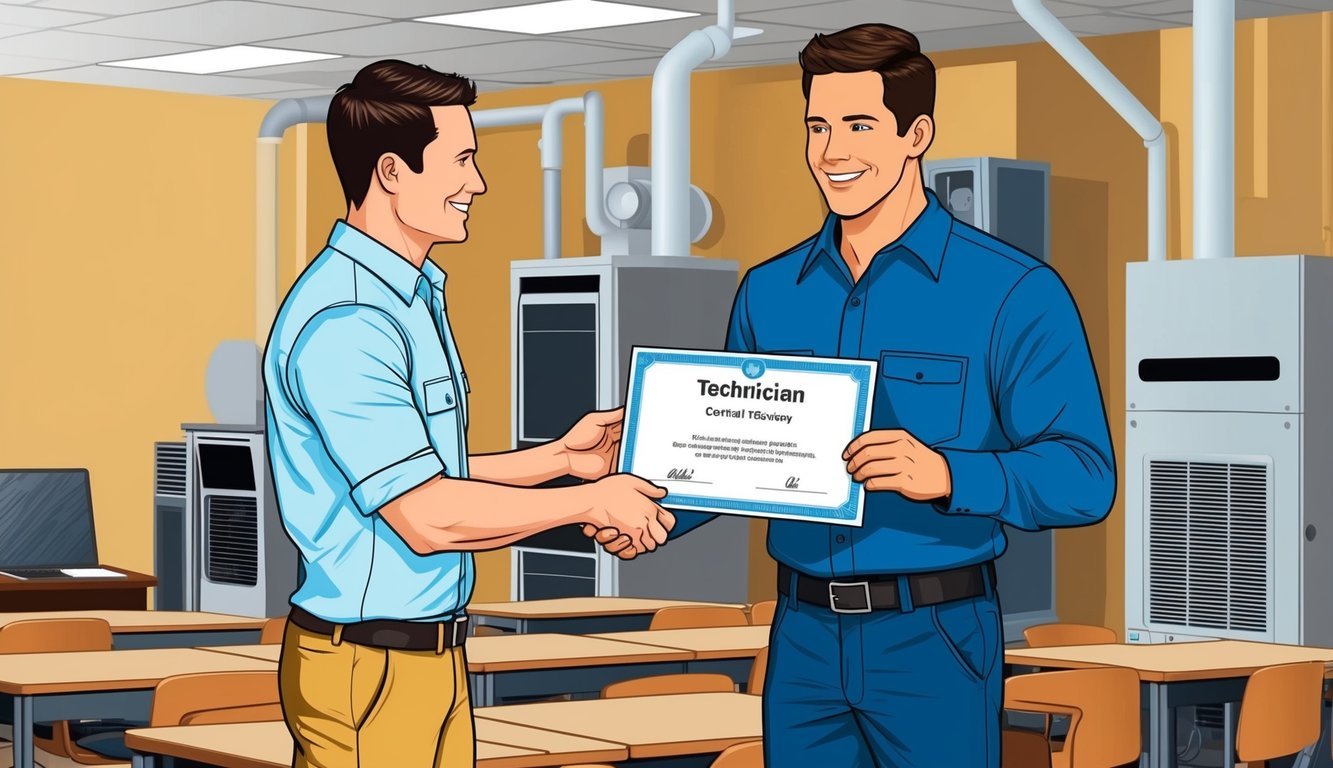
Getting certified in HVAC isn’t just about a shiny piece of paper—it can really bump up your career and show you know your stuff.
It opens doors and proves you’re on top of the game in industry standards.
Career Advancement Opportunities
HVAC certification can elevate your career to new heights.
With the right certifications, you might land better jobs and bigger paychecks.
Many employers prefer certified techs when making hiring or promotion decisions.
You’ll shine brighter among other job seekers.
Certified professionals often snag the coolest projects and leadership roles.
Plus, specialization in areas like green tech or commercial systems can really set you apart.
Certifications also show you’re serious about your role.
They prove you’ve got skills that go beyond the basics, earning you more respect from peers and clients alike.
Industry Standards Compliance
Keeping up to date with certifications helps you stay current with the ever-evolving HVAC landscape.
With new tech and regulations popping up regularly, it’s important to stay in the loop.
Some certs, like the EPA Section 608, are basically required to work with specific refrigerants.
Other certifications demonstrate your knowledge of safety protocols and best practices.
Certified techs are typically more reliable.
This means happier customers and fewer callbacks.
It’s not just about doing quality work; it’s about ensuring safe and environmentally-friendly practices, too.
Plus, many certifications cover the latest in energy-efficient systems.
Knowing this can help your clients save cash and lessen environmental impact.
It’s definitely a win-win.
Types of HVAC Certifications
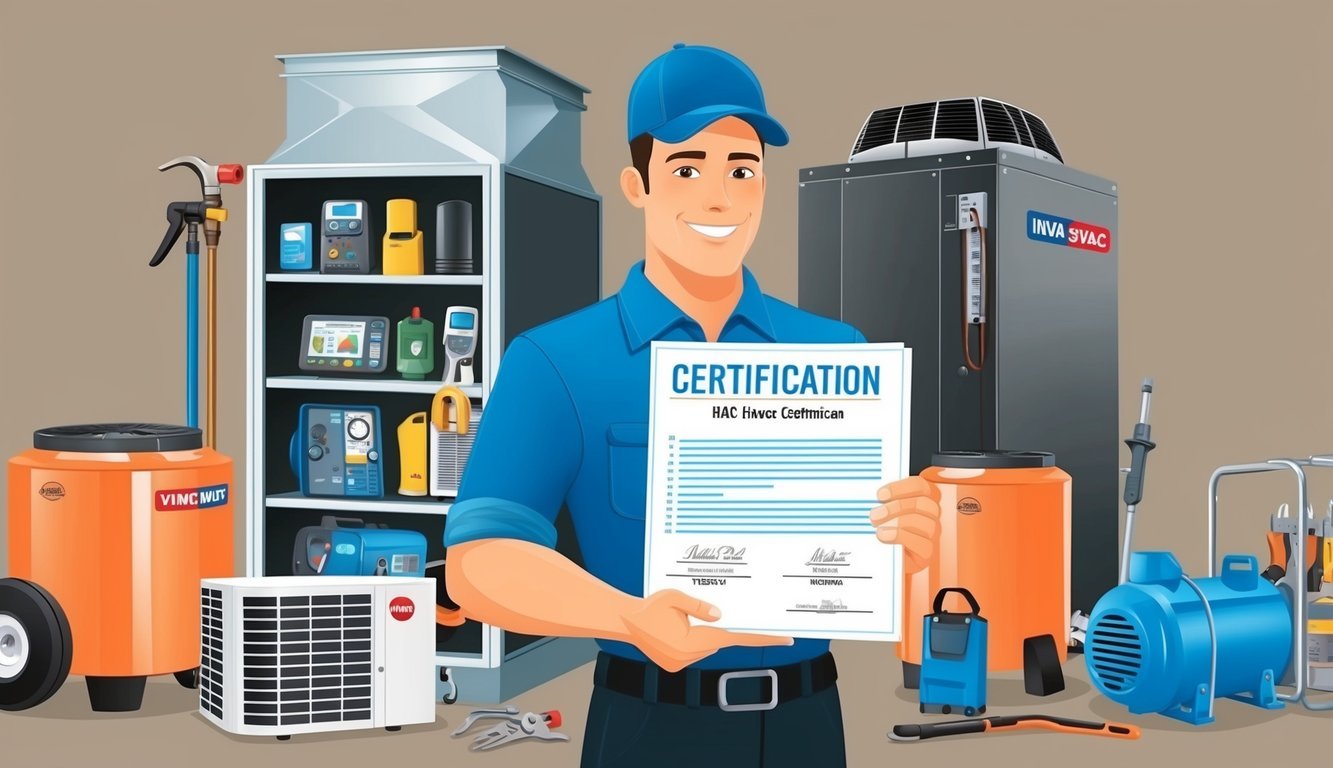
HVAC certifications come in a variety of shapes and sizes.
They show what skills you’ve got and what jobs you’re capable of tackling.
Some are broad, while others are for specialized tasks.
Technician Certifications
The EPA Section 608 certification is essential for HVAC techs.
It’s required to work with refrigerants.
There are four types:
- Type I: For small appliances
- Type II: For high-pressure systems
- Type III: For low-pressure systems
- Universal: Covers them all
The cost to take the test ranges from $20 to $150, and you’ll need to score at least 70% to pass.
NATE certification is another biggie.
While it’s not mandatory, it shows you know your stuff inside and out.
You can specialize in areas like air conditioning or heat pumps.
Specialty Certifications
Got a thing for car A/C? You’ll need a EPA 609 certification.
It’s a 25-question test that lets you legally handle car refrigerants.
If you’re focused on green energy jobs, consider looking into IGSHPA certification.
It’s specifically for geothermal heat pump installers.
For those who like working with gas, snagging a NATE Gas Heating certification is a smart move.
It shows you can safely install and repair gas heating systems.
These specialty certs can help you stand out.
They prove you’ve got skills in specific HVAC areas.
Continuing Education
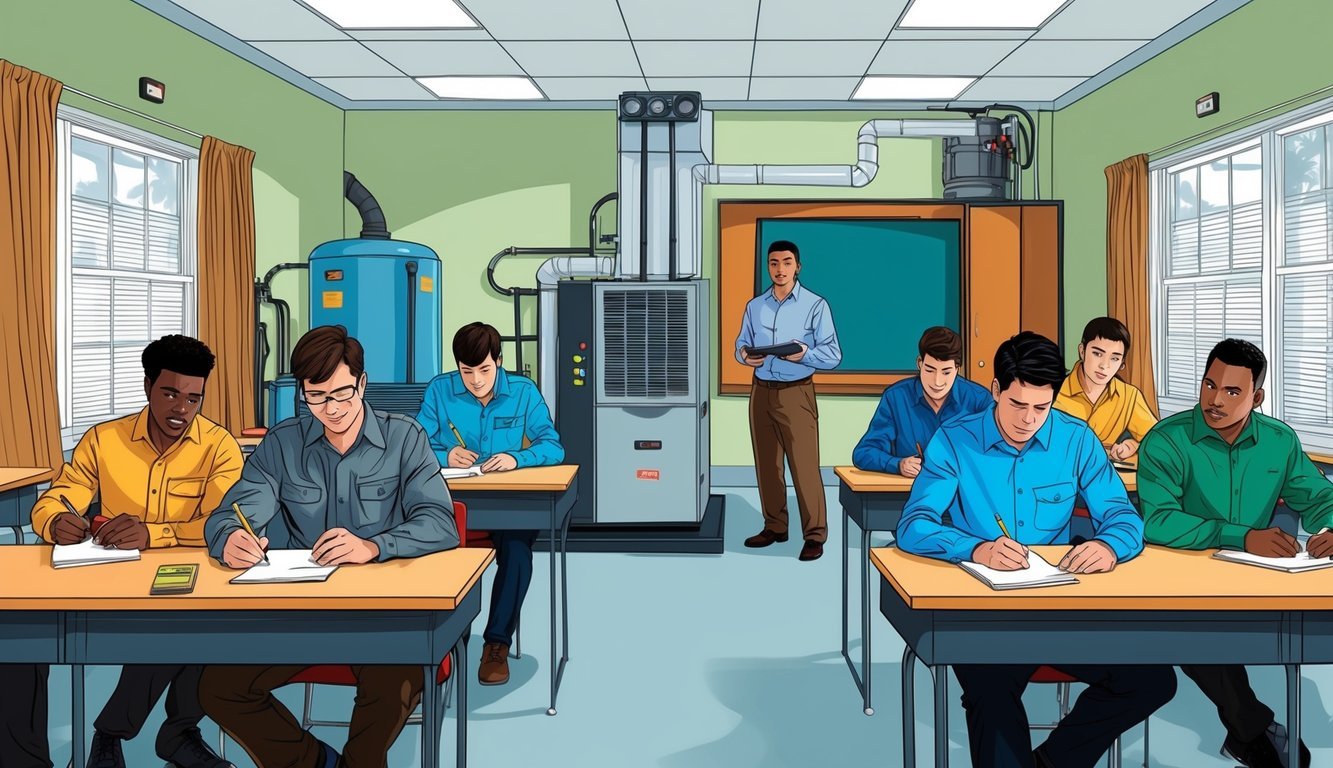
HVAC pros need to keep learning to stay sharp.
New tech and rules crop up frequently in this field, so let’s check out some ways to keep your skills fresh.
Online Learning Options
Online HVAC training programs are super convenient.
You can learn from the comfort of your home at your own pace.
These courses cover everything from the basics to advanced techniques.
Many online programs offer continuing education units (CEUs), which are invaluable for keeping your license current.
You can dive into topics like energy management and system design, among others.
Some schools even provide full online HVAC certification programs.
They usually come in cheaper than in-person classes but still cover all the important stuff through your screen.
Workshops and Seminars
In-person learning has its own set of advantages.
Workshops and seminars let you gain hands-on experience.
You can ask questions on the spot and connect with fellow professionals.
Many trade schools and companies put on these events.
They might cover new technologies, safety regulations, or specific equipment brands.
Some are quick one-day deals, while others might last a week.
Keep an eye on local HVAC groups or unions, too.
They often host training sessions that help you understand local codes and regulations—and might even lead to new friendships!
Frequently Asked Questions
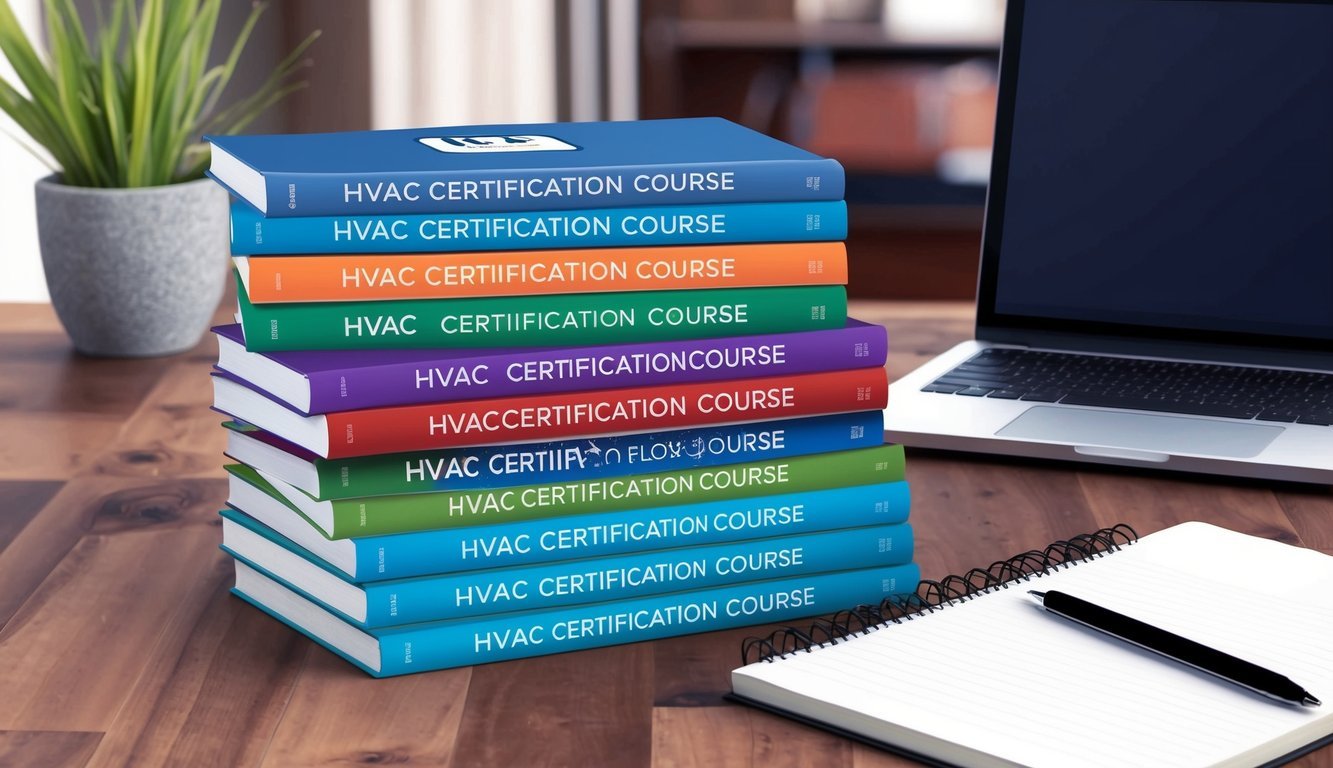
Getting your head around HVAC certification can be tricky.
Let’s clear up some common questions about earning your stripes and finding the best programs.
Which online platforms offer the top HVAC certification programs?
Look no further than Penn Foster, which offers a solid HVAC/R Technician Certificate.
Another reputable option is the NATE Certification program.
Both platforms let you study at your own pace, right from home.
How long does it usually take to complete an HVAC certification course online?
Most online HVAC certification courses take between 6 to 12 months to complete.
But it all boils down to how much time you can invest.
Some folks finish faster, while others might take a bit longer.
The flexibility allows you to fit it into your life!
What are some top-rated HVAC schools in Texas?
If you’re in Texas, check out HVAC Excellence programs available in the state.
They deliver top-notch training and have a great reputation in the industry.
Local community colleges often host solid HVAC programs too.
Can I get HVAC certified for free, and if so, where?
Free HVAC certification isn’t common, but you might come across some budget-friendly options.
The EPA Section 608 Certification is required and usually costs only a bit.
Some employers even offer to cover certification expenses if you’re working for them.
What is the highest level of certification I can achieve in HVAC?
Usually, the highest HVAC cert is considered to be the RSES Certificate from the Refrigeration Service Engineers Society.
It demonstrates you’re a top-notch professional in the field—achieving it requires a lot of study and experience.
How many certifications are typically recommended for a successful career in HVAC?
You don’t need a ton of certs to thrive in HVAC.
Starting with the EPA Section 608 and one or two others like NATE or HVAC Excellence is a great plan.
As you progress in your career, feel free to add more specific certifications that align with your job.

